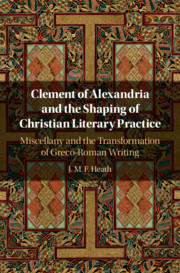 Clement of Alexandria and the Shaping of Christian Literary Practice
Clement of Alexandria and the Shaping of Christian Literary Practice Defining Features, Scope and Method
Published online by Cambridge University Press: 16 December 2020
‘Miscellany’ is not an ancient genre name. When scholars use the term, they are often vague about the definition and boundaries of the genre, and rely on well-known ‘examples’ that are treated as paradigmatic. Two scholars have sought to define the ‘miscellany’ more closely: Teresa Morgan gave a broad, inclusive definition grounded in the history of educational praxis; William Fitzgerald gave a narrower definition, focusing on the rhetorical characteristics of an elite, literary strand of miscellany-making. Fitzgerald's approach shall be our starting point as we investigate how and why Clement artfully deployed rhetorical tropes, imagery and metatextual observations to thematise his intentional participation in a wider discourse of learned literary miscellanism. But we must also situate his work in relation to particular examples of early imperial prose miscellanies, otherwise we risk lapsing into generalities about an irreducibly diverse group of texts. Plutarch’s Table Talk; Pliny’s Natural History; Gellius’ Attic Nights and Athenaeus’ Deipnosophists are introduced alongside Clement’s Stromateis,as appropriate for comparative study.
To save this book to your Kindle, first ensure [email protected] is added to your Approved Personal Document E-mail List under your Personal Document Settings on the Manage Your Content and Devices page of your Amazon account. Then enter the ‘name’ part of your Kindle email address below. Find out more about saving to your Kindle.
Note you can select to save to either the @free.kindle.com or @kindle.com variations. ‘@free.kindle.com’ emails are free but can only be saved to your device when it is connected to wi-fi. ‘@kindle.com’ emails can be delivered even when you are not connected to wi-fi, but note that service fees apply.
Find out more about the Kindle Personal Document Service.
To save content items to your account, please confirm that you agree to abide by our usage policies. If this is the first time you use this feature, you will be asked to authorise Cambridge Core to connect with your account. Find out more about saving content to Dropbox.
To save content items to your account, please confirm that you agree to abide by our usage policies. If this is the first time you use this feature, you will be asked to authorise Cambridge Core to connect with your account. Find out more about saving content to Google Drive.